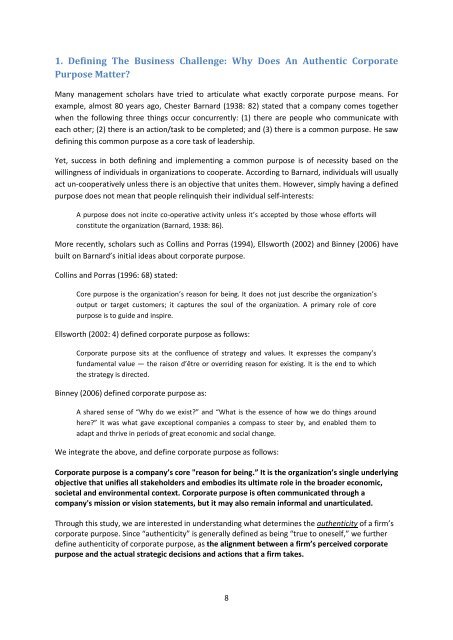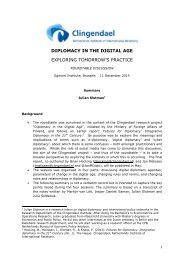BM_IMD_REPORT-How-Authentic-is-your-Corporate-Purpose
BM_IMD_REPORT-How-Authentic-is-your-Corporate-Purpose
BM_IMD_REPORT-How-Authentic-is-your-Corporate-Purpose
You also want an ePaper? Increase the reach of your titles
YUMPU automatically turns print PDFs into web optimized ePapers that Google loves.
1. Defining The Business Challenge: Why Does An <strong>Authentic</strong> <strong>Corporate</strong><br />
<strong>Purpose</strong> Matter?<br />
Many management scholars have tried to articulate what exactly corporate purpose means. For<br />
example, almost 80 years ago, Chester Barnard (1938: 82) stated that a company comes together<br />
when the following three things occur concurrently: (1) there are people who communicate with<br />
each other; (2) there <strong>is</strong> an action/task to be completed; and (3) there <strong>is</strong> a common purpose. He saw<br />
defining th<strong>is</strong> common purpose as a core task of leadership.<br />
Yet, success in both defining and implementing a common purpose <strong>is</strong> of necessity based on the<br />
willingness of individuals in organizations to cooperate. According to Barnard, individuals will usually<br />
act un-cooperatively unless there <strong>is</strong> an objective that unites them. <strong>How</strong>ever, simply having a defined<br />
purpose does not mean that people relinqu<strong>is</strong>h their individual self-interests:<br />
A purpose does not incite co-operative activity unless it’s accepted by those whose efforts will<br />
constitute the organization (Barnard, 1938: 86).<br />
More recently, scholars such as Collins and Porras (1994), Ellsworth (2002) and Binney (2006) have<br />
built on Barnard’s initial ideas about corporate purpose.<br />
Collins and Porras (1996: 68) stated:<br />
Core purpose <strong>is</strong> the organization’s reason for being. It does not just describe the organization’s<br />
output or target customers; it captures the soul of the organization. A primary role of core<br />
purpose <strong>is</strong> to guide and inspire.<br />
Ellsworth (2002: 4) defined corporate purpose as follows:<br />
<strong>Corporate</strong> purpose sits at the confluence of strategy and values. It expresses the company’s<br />
fundamental value — the ra<strong>is</strong>on d’être or overriding reason for ex<strong>is</strong>ting. It <strong>is</strong> the end to which<br />
the strategy <strong>is</strong> directed.<br />
Binney (2006) defined corporate purpose as:<br />
A shared sense of “Why do we ex<strong>is</strong>t?” and “What <strong>is</strong> the essence of how we do things around<br />
here?” It was what gave exceptional companies a compass to steer by, and enabled them to<br />
adapt and thrive in periods of great economic and social change.<br />
We integrate the above, and define corporate purpose as follows:<br />
<strong>Corporate</strong> purpose <strong>is</strong> a company’s core "reason for being.” It <strong>is</strong> the organization’s single underlying<br />
objective that unifies all stakeholders and embodies its ultimate role in the broader economic,<br />
societal and environmental context. <strong>Corporate</strong> purpose <strong>is</strong> often communicated through a<br />
company's m<strong>is</strong>sion or v<strong>is</strong>ion statements, but it may also remain informal and unarticulated.<br />
Through th<strong>is</strong> study, we are interested in understanding what determines the authenticity of a firm’s<br />
corporate purpose. Since “authenticity” <strong>is</strong> generally defined as being “true to oneself,” we further<br />
define authenticity of corporate purpose, as the alignment between a firm’s perceived corporate<br />
purpose and the actual strategic dec<strong>is</strong>ions and actions that a firm takes.<br />
8








